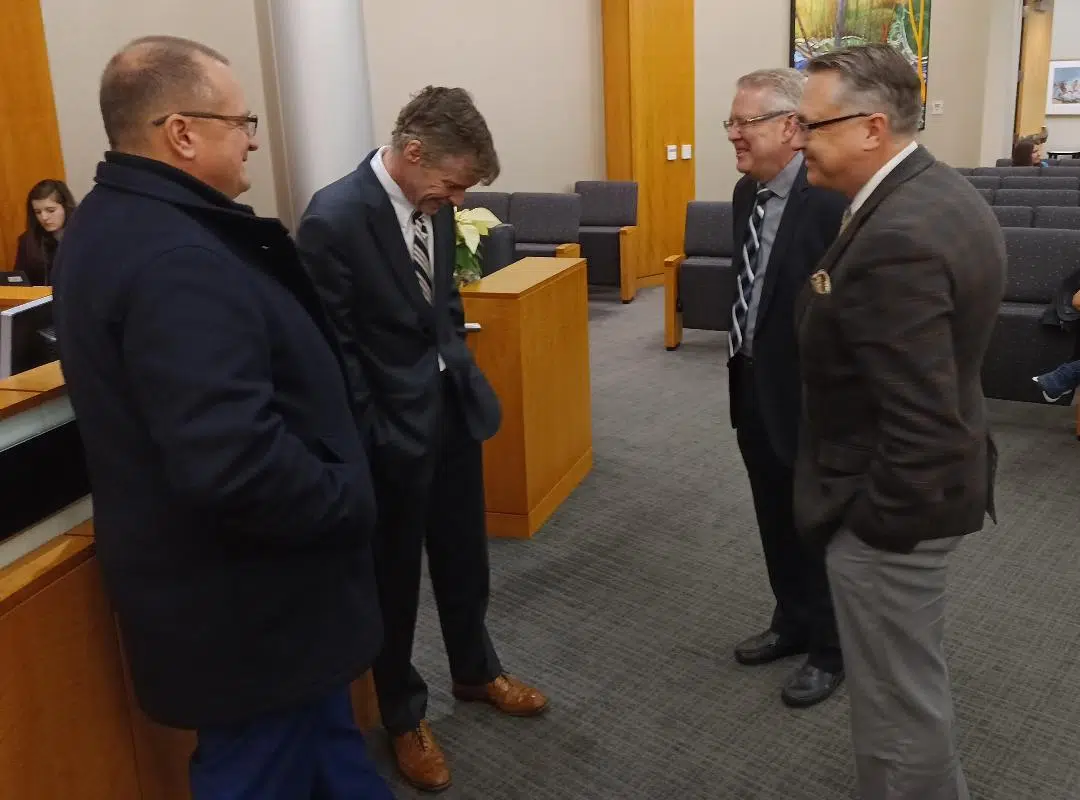A battle involving Titans is underway in the circumsphere of a hearing before the Normal Electoral Board. Michael Kasper who has Mike Madigan as a client, has been hired as the attorney for Normal. Tom DeVore, who sued JB Pritzker, is representing the petitioners. And Todd Greenburg, former Bloomington City Attorney, is representing the objectors.
The objectors claim that petitions filed by three residents to run for three elected offices that the town does not hold elections for were invalid. The hearing is currently in recess to allow the attorneys to have additional time to file and exchange documents.
Scott Preston, a member of the board, explained to Cities 92.9 why the hearing is in recess.
“We did recess without making any formal determination one way or the other. Both sides legal counsels have some things they need to work through on this. So we did recess to allow that process and legal process, that’s going through the courts to play out. And there is not a set time for that but we are recognizing that the timing is of the essence,” Preston said.
Preston continued, “Thus we are making sure that everybody has enough time on all sides to do what they need to do. We know that time is ticking toward that April election and getting those ballots certified of whether or not the names will be on there or not. So we recessed to let that process play out.”
Several things were self evident at the hearing.
Mayor Chris Koos, Chair of the board, was not in attendance. Board Vice Chair and Normal Trustee Kevin McCarthy held the gavel instead.
Kasper sat at the dais and acted as the town’s Corporate Attorney. Corporate Attorney Brian Day did not sit at the dais.
Town Trustee Scott Preston is serving on the board. Town Clerk Angie Hounker is not.
Hounker is not serving because the petitions being objected to claim the Town Clerk position should be elected, not appointed, which is how Hounker got the position. Those petitions also call for a Collector and a Supervisor to be elected. Hounker and two other employees of the clerk’s office attended the hearing.
The petitioners are: Amy Conklin, who filed for Town Clerk; Charles Sila, who filed for Town Collector and Robert Shoraga who filed for Town Supervisor.
The objectors are Patrick Dullard and Jeff Fritzen. Both filed objections to the petitions for these positions.
Greenburg responded to the press after Friday’s portion of the hearing and provided his argument regarding why the town is not required to have the offices specified for towns by state statute that the petitioners submitted their petitions for.
Greenburg said, “It applies to the Town of Cicero. The legislature didn’t say that. But those are Township offices. Cicero is a town that superseded a Civil Township. Townships have Supervisors. Townships have Collectors. Townships have Town Clerks. Now here we have a Town Clerk but it doesn’t set forth that it’s going to be an elected town clerk.”
DeVore also spoke with the press. He laid out his case as follows;
There is a statute in Illinois for Incorporated Towns. As my colleague said there are not many Incorporated Towns left. These are types of municipalities that existed before the 1870 Constitution. So they are rare.”
There is a statute that was passed back in the 1980’s that says if you are an incorporated town over 25,000 people by the law you have to have certain elected offices. My clients petitioned for those elected offices.
Now prior to their petition those offices haven’t been elected in Normal. The Municipal Code that they have here in Normal doesn’t call for them. Actually your clerk is appointed by Municipal Code. Their suggestion is that they don’t have to follow the state law.
My clients position is you do have to follow the state law. If you go back to the prior case that you guys had here a couple of months ago the judge actually talked about that in great detail even though it wasn’t the issue that was in front of him at that time. So he wasn’t ruling on it.
But his analysis was he found no reason why the Town of Normal, which is a type of municipality, in addition to cities and villages. He didn’t see any reasons why they shouldn’t be following that law. But again he didn’t rule on it because it wasn’t in front of him. So I think my colleague and I agree that the court is going to have to resolve this issue.
The suggestion that somehow or another Cicero might have to comply with that but not the Town of Normal, I don’t understand that legal argument. But you have to make an argument of some sort. And the suggestion is that my clients should have to go to court first and argue that the court needs to force the town to recognize those elected offices.
Again I don’t agree with that either because the law that was passed 35 years ago said that those offices exist by election so the mere fact that nobody has petitioned for them until now is not legally relevant.
The fact of the matter is you now have petitions for the first time for those elected offices and this board needs to recognize those petitions because state law says you have to have those offices.
Those are the distinct legal arguments and again the court is going to have to reconcile that and give a decision to this town of how they need to move forward. Is there some legal theory that they can disregard that state law? I am not familiar with what that is going to be.
My colleague will try to come up with something but if you go read that particular section of the statute it’s crystal clear. This is an incorporated town. It’s over 25,000 people. It says you shall, which is mandatory, have these elected offices. My clients have petitioned and they expect those petitions to be recognized and the circuit court of this area is going to figure that out.











